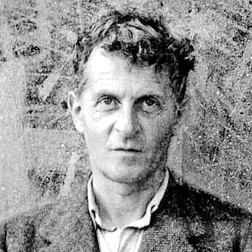Linguistic therapy for philosophers

|

Ludwig Wittgenstein: Some philosophers (or whatever you call
them) suffer from what may be called “loss of problems.”
Then everything seems quite simple to them, no deep problems
seem to exist any more, the world becomes broad and flat and
loses all depth and what they write becomes immeasurably
shallow and trivial. Russell and H.
G. Wells suffer from this. |
Most philosophers seem to be eccentric to a certain extent. As they
dabble in abstract thought ordinary people cannot understand who they
are. Ludwig Wittgenstein (1889-1951), the 20th century’s leading
philosopher, is no exception. Some people hailed him as a philosopher’s
philosopher and a genius whose work and thinking are audacious,
complicated, austere, obscure and unsystematic. His detractors, however,
consider him as a marginal and overrated character.
A peep into his personal life would reveal that Wittgenstein was a
highly talented youth who taught himself music and how to play the
clarinet. He also studied architecture and wanted to become a priest. At
one stage he became a film buff. Even as a child he displayed his
unusual mechanical talents by producing a model of a sewing machine.
As a young man he studied arts. After some time, he followed a course
in aeronautical engineering at Manchester University. At this time he
became interested in mathematics which in turn led him to study
philosophy. He went to Cambridge University where the celebrated
philosopher Bertrand Russell was teaching. At first, Russell took him to
be a German and said, “My German engineer, I think, is a fool. He thinks
nothing empirical is knowable - I asked him to admit that there was not
a rhinoceros in the room, but he couldn’t.”
Great event
Before long, Russell changed his mind and said, “Wittgenstein has
been a great event in my life ... I love him and feel he will solve
problems I am too old to solve.” Inspired by his guru’s commendation,
Wittgenstein followed the complicated path of studying philosophy.
Wittgenstein’s wrote his major work Tractatus - Logico -
Philosophicus that called for clarity in philosophy. He vehemently
rejected earlier philosophical ideas about existence, knowledge, truth
and value on the ground that they are illusory. He argued that what can
be said can be said meaningfully. Similarly, what can be said is the
same as what can be thought and understood. He said that philosophers in
the past had tried to think what is unthinkable. This does not mean that
ethics, religion and aesthetics are nonsensical. But trying to to say
anything about them is nonsensical.
Wittgenstein, like many others of his ilk, was concerned with the
meaning of life. His deconstruction of traditional philosophy is not
intended to leave us with nothing of value. It is an ethical and
therapeutic enterprise, a way out of cloudy, empty babble, an
encouragement to shut up and look. If we do so, we might see the world
not just aright, but afresh. What we cannot speak about we must pass
over in silence.
Strange
It is strange but true that after writing Tractatus, Wittgenstein
tried to give up philosophy by engaging himself in various other jobs
such as gardener, school teacher and psychologist. In Tractatus he
postulated that structure of the real world determined the structure of
language. He treated words as tools and sentences as instruments. His
philosophy can be summarised in his own words: “Our task as philosophers
consists not in solving grand, super problems but in assembling
reminders for a particular purpose, the purpose of seeing how language
really works.”
Although Tractatus won him critical acclaim in European schools of
thought, in later years Wittgenstein became its bitterest critic. He
spent two decades to clarify and dispel the philosophical confusions
found in his early thinking. His scathing attacks on Tractatus are found
in his posthumously published Philosophical Investigations.
Linguistic philosophy
Wittgenstein is credited with bringing forth linguistic philosophy
which is now referred to as analytic philosophy. It has dominated the
philosophers of the English speaking world for more than two and a half
decades. According to him, it is the philosophers who misuse the
language and create problems.
Wittgenstein believed that philosophers must be given therapy for
their confusion. He said that philosophy itself must be dissolved. The
linguistic therapy can be administered only by cured philosophers. It is
assumed that Wittgenstein and his followers belong to that category.
Today Wittgenstein’s analytical philosophy is in disintegration as
its crusade against philosophy has come under attack. Its analyses are
increasingly regarded as tedious and trivial. However, Wittgenstein’s
stature as a philosopher remains unsullied.
|

